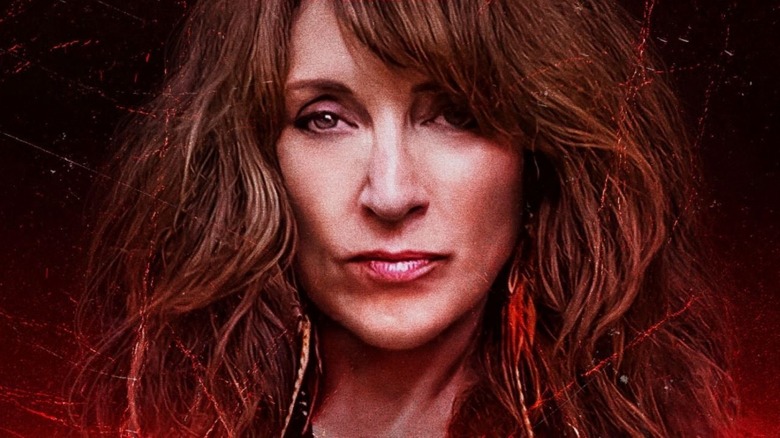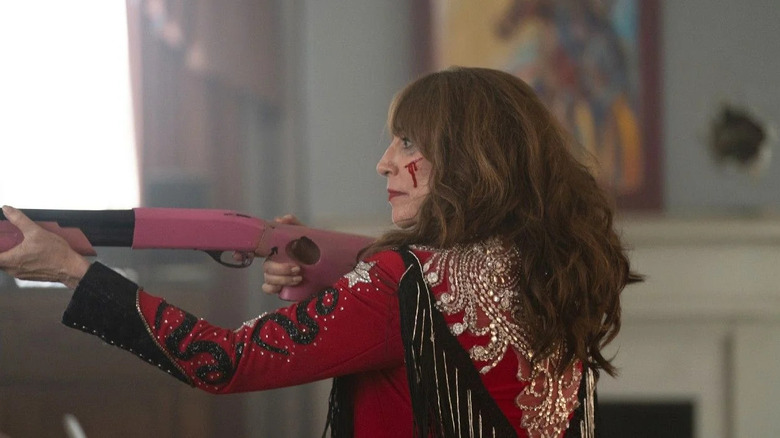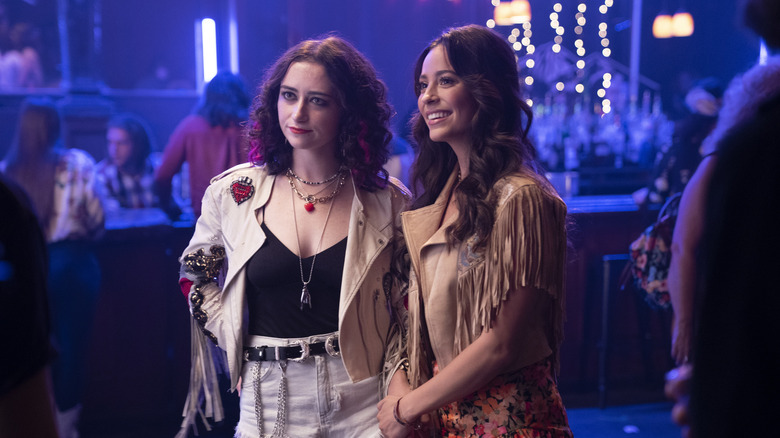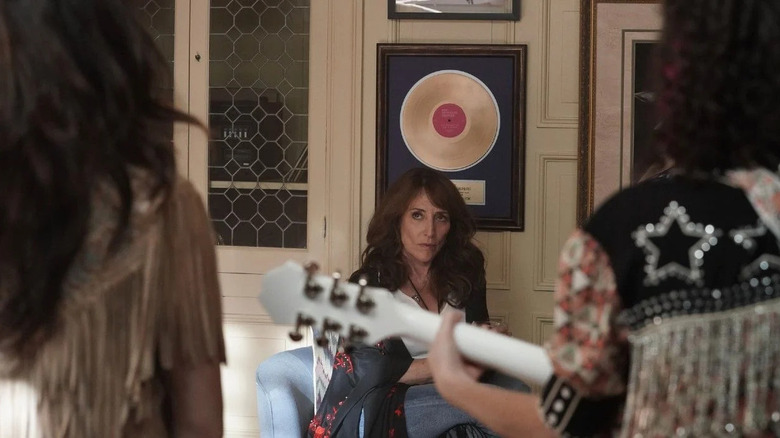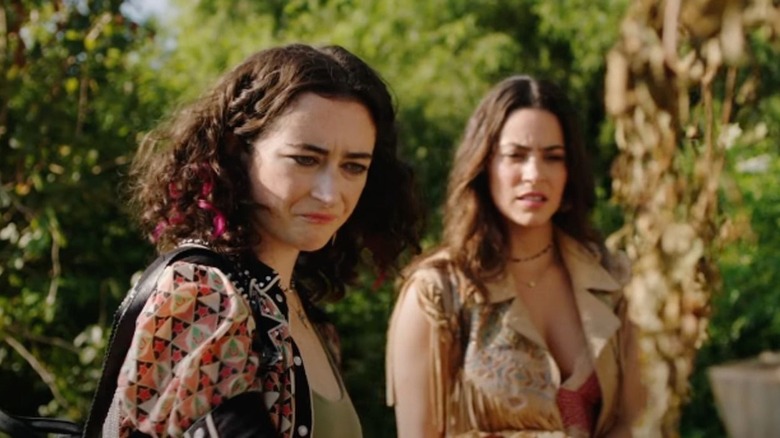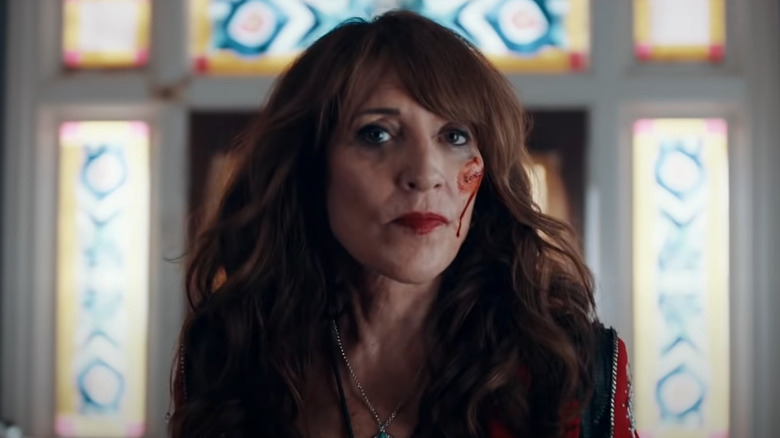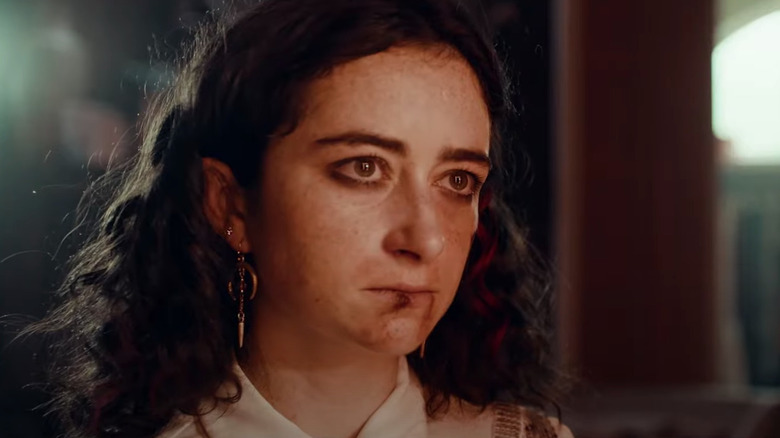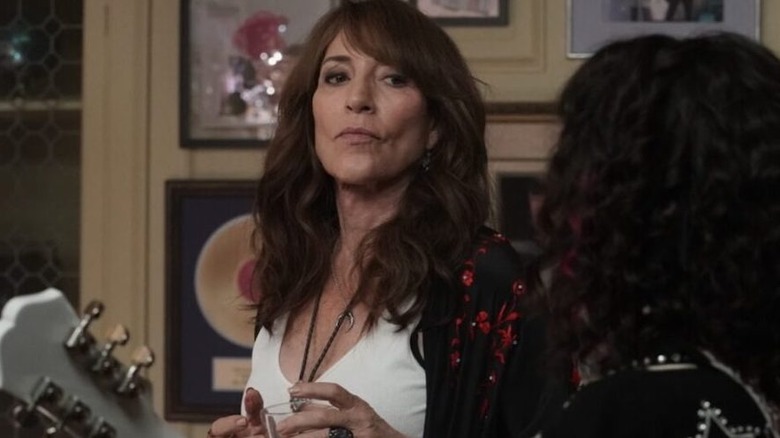Torn Hearts Director Brea Grant On Making A Colorful Country Music Horror Movie [Interview]
Never meet your heroes, they say ... "Torn Hearts" is about two rising artists in the country music world, Jordan Wilder (Abby Quinn) and Leigh Blackhouse (Alexxis Lemire), meeting the woman who inspired them, the legendary Harper Dutch (Katey Sagal). They drink, they sing, and they even live together. The dream does not match the reality, though, which is one of the themes director Brea Grant explores in her aesthetically poppy but thematically dark horror film.
"Torn Hearts" is the director's third feature to date following "12-Hour Shift" and "Best Friends Forever." With her well-received Blumhouse picture, which Rachel Koller Croft wrote, Grant puts together a rare mix on-screen of country music and horror. "I think it was a big swing," Grant said. "Most of those people were probably not country music fans, so I was very concerned about how the horror community would react to a country music thing. I feel like a metal band, or like a punk band, those go hand in hand more with horror than country music, but hopefully, I changed that a little bit."
To coincide with its release, Grant told us about creating the world of "Torn Hearts," from the music to the film's main setting, and about her journey as a filmmaker.
'Lean into the weirdness of it'
This is a very colorful horror movie. How'd you land on that choice?
The script that Rachel wrote had a pink gun in it, which I was like, "Never seen that before, that's interesting." When I signed on to do the movie, I basically made this whole packet full of aesthetics and wanted to lean far more into the pop, the pink, the femininity of it, because it's three women on screen. It could be a dark house, it could be a creepy house, but I thought there'd be something fun and whimsical about it on top of all of the psychological horror that's happening. I made this big packet that was like, "Pink guns, put pink in every frame, lean into the weirdness of it."The aesthetic is like maximalist feminine. Feminine maximalism, how about that?
[Laughs] I also think it works just with the themes of the story. It almost feels like a doll's house.
I love that. Well, we talked a bit about things like "Grey Gardens" or "Sunset Boulevard," houses that had this almost borderline hoarder aesthetic, but also, what she would actually have in her house. If she had this giant house in the middle of nowhere and no one has been there, what would it look like? She came from this '80s, '90s world of fringe and bright colors and sparkles, so why would the house not reflect that?
I mean, it's a weird movie because most of it is daytime, which is not typical for a horror movie. There are very few daytime horror movies. I think that night is scarier, but there's nothing scarier than a crazy woman with a pink gun.
Also strangely enjoyable, at least when Katey Sagal is holding that shotgun.
Isn't she so great? I don't read reviews, but I was sent a couple and I love how much people are talking about her. She's very excited about how much people are responding to the character. She came in and brought that character to life in a way that I didn't know how it would go without an actress of that caliber. When you get someone like Katey Sagal, she just comes in and is very cool with doing anything, chewing it up and making a big meal out of it.
'There's all sorts of weird little Easter eggs'
How did the finger tapping come about?
That was Katey! This is what happens when you hire actresses who know what the f*** they're doing. She and I had a call after I sent her an email begging her to be in the movie, and she wanted to talk about the character and why the character was doing what she was doing. We talked more the closer we got to shooting, and she had a lot of questions, a lot of thoughts about, "How is she getting her food, because she doesn't leave her house? What would she be into?" There's all sorts of weird little Easter eggs around the house that are things that Katey and I talked about.
But then Katey also was like, "I think I would have some sort of nervous tic," and she just started doing it. I was like, "Oh, we're going to shoot that." Every time she would do it, I'd look at the DP and he'd look at me and I'd be like, "Make sure we get a little shot of that." I started planning shots around that where I'm like, "Oh, maybe your hand is up here and you're tapping." It's such a great little character piece that I think causes anxiety, but also is channeling the anxiety that she probably has.
So was "Sunset Boulevard" a big influence?
I thought about it a lot. Obviously a classic, a great movie. I would say I leaned in more to "Misery" when I was thinking about what I was going for.
Like "Misery," visually, how do you make the most out of one location?
I, as a filmmaker, haven't really had any other huge locations. My last movie was shot on one floor of a hospital, so I'm good with limits. For me, it was about production design, making sure that the house, every angle was interesting so we could use every direction, and we weren't limited. It was also about the journey, the Alice In Wonderland journey as they go through. Once they went through the gate, I wanted it to get weirder and weirder the more they went along. The living room is pretty normal and stuff that you might see in your weird aunt's house or maybe an eccentric celebrity's house.
As you go into the kitchen, you're like, "Oh, now there's bottles everywhere." It's slightly weirder, the color of the walls is a little uncomfortable. As you go deeper into the house, more and more secrets are revealed. As you get into the heart of the house, it is very pink and very disturbing. For me, it's about finding a way to make each and every room interesting, and telling a story with each and every shot. I feel very fortunate, because I had a DP who was on board for creating interesting aesthetic choices and making the world feel big.
Being on set, enjoy that you're here because God knows when you're going to be back
When did you realize you were happier behind the camera than in front of it?
Yeah, happier. Well, I directed my first movie in 2012, and it wasn't then. That movie was rough, as a lot of people's first movies are. And then I directed "12-Hour Shift” in 2019, and that was about the time I realized I was still enjoying acting, but not to the place that I had enjoyed it up until then.
I got to do some really cool projects, I got to do "After Midnight” with Jeremy Gardner and I got to do "The Stylist," and then I got to do "Lucky," which I wrote. I was doing these cool projects, but I was feeling more motivated by sitting at home on my couch and writing. Very motivated by writing. It was about four years ago I started making the transition, and luckily, I had a really good team that was supportive of me.
My manager was very supportive of me just directing and writing. It was a gradual transition. When people ask me to do stuff it's hard to say no, but I just felt everything in front of the camera, I had done everything I could do. I did a 10-minute monologue and a movie that went to Tribeca. I don't know, as far as acting goes, that was sort of like, "Oh yeah, this is why I got into this."
I stretched those creative muscles, and I had a lot to offer creatively that I wasn't getting to do as an actress. I love actors, and I think what's great about being a director is I get to still do all of the things that I enjoyed as an actor. I get to be creative, I get to collaborate, which I love, and I get to work with actors. I'm an actor's director, really. I love working with actors on their characters, I love getting into the small things that they're working out, I love letting them improv and throwing them new stuff.
Did you always know you wanted to tell stories in genre?
This is what I consume. Genre is what I consume. It'd be hard to imagine doing anything else outside of that. I do some work outside of genre, but for the most part, everything I create is going to have a genre bent whether or not I mean it to. I just worked on a show, and it was a drama, and I wrote a ghost into it. My brain is going to continue to go genre even though I'm not necessarily asked to do that. I like working within the genre community. I feel like the community is nice and supportive, and I think that some of the most creative things happening are in the genre world. I got to do "CSI" and very straightforward comedy and things like that, but I kept coming back to genre because I just found the sets were the happiest places.
Why is that?
I spent so much of my time on set. I really entered the industry on set, I learned to act in front of a national audience. NBC taught me how to act, I didn't know anything until I walked onto a set and people had to explain things to me. I didn't go to film school, I didn't go to acting school, so I learned everything from being physically on a set. And so, I think I'm very comfortable there, but I also look for the happiest people there, the people who are actually enjoying their work, and it's the horror folks. It's the genre kids. We're laughing, having a great time. Not always, I mean, there are dark moments, there are definitely been days on sets as an actress that I've cried all day because of what was required. It's tough, it's emotionally draining, but I was always happier on those sets.
'We're all very lucky to get to do this'
NBC was almost your film school, so what were some of the key lessons as both an actor and filmmaker?
Well, my first big show was "Friday Night Lights," and then "Heroes." I got to work with some legends on "Heroes." Greg Grunberg being one that I worked with all the time, but I got to work with Malcolm McDowell, all these huge actors. Ones that work a lot are very kind, they are nice to the people around them. Greg Grunberg, he knew everyone's name on set, he took the time to know things about them, because you're with these people day in and day out, and you should know your PA's name. I think that was something that I learned from him from these sort of veteran actors. You can get babied as an actor, you can get treated with a lot of ... You get a lot of special perks as an actor. You show up later than everyone else, you leave before everyone else, and people bring you water. That's your job!
It's not an easy job, I don't think acting is easy by any stretch of the imagination. I think getting the job is hard for an actor, so once you're there, it should be a little bit easier, especially for you to just stay in the right frame of mind. But I think from that time, I learned that I wasn't more special than anyone else, and that was important. I think the other thing I learned is that we're all very lucky to get to do this. I did "Heroes," and then I didn't work for a while after that, and it was hard for me to get a job. I didn't know what I was going to do next, and I realized that as quickly as this s*** comes, it can be taken away so quickly. So, I try to enjoy every aspect of it, particularly the making of, which has always been my favorite part anyway. Being on set, enjoy that you're here because god knows when you're going to be back.
'You have to fight like hell to be there'
Obviously, this movie is very specific to country music, but the themes could apply to so many industries, especially film. How'd you relate to the characters and themes in "Torn Heart"?
It completely relates to the film industry. What drew me to the script were the themes of aging within the industry, particularly for women, what it looks like to age within the industry and how it quickly goes from, "Oh, you're a great young ingénue," to, "You're over 35 and no one wants to see you anymore." It is a very drastic change, and I will say personally, I have experienced it. There got to be an age where I was getting less phone calls as an actress. And so, that part spoke to me as this industry that sucks you in, takes all of your youth and your life, and then spits you back out, which was the "Sunset Boulevard" of it all.
The industry is a rough place to be. You have to fight like hell to be there, and then you have to make all of these very difficult decisions, and then you're punished for all the decisions that you do make. My big thing going into the movies [was] I didn't want to judge these characters for that. Look, it's a horror movie, so everybody gets something in the end. I won't say what, but I think the whole thing is that they're all pitted against each other in a way that they can't help, because they just want to do this one thing. They all want to play music, and you shouldn't be punished because you want to play music, because you're following the rules that the industry has laid out for you, which I think is exactly what you're doing. I think they're all following the rules that the industry has told them.
[Spoiler Alert]
And it's the guy musician who comes out on top in the end.
We talked about this so much about whether or not it was a feminist ending. Blumhouse agreed at the end that it was a realistic ending, that when you pit these women against each other, none of them will win. I'm not saying it's prescriptive, and I'm not saying this is what women should do. I'm saying you end up with these three mega-talented, very ambitious women who just want to have the success that their male counterparts have. They get pitted against each other for one slot, and the slot goes to a man.
[Spoiler Over]
'It's helpful when you have people who play instruments and sing'
Since the music and performances are believable in the movie, how did you want to get your portrayal of the country world just right?
Well, I limited my casting to people who could sing and play instruments, so that was the first thing I did. Abby is a great guitarist. Really, my pet peeve is when you see someone strum and they're not quite strumming right. My boyfriend is a music producer. There were multiple times we were in the cut and he would come in and say, "That looks fake," and I have to redo things.
It's helpful when you have people who play instruments and sing, so I didn't have to bring in other people to do their voices. I even recorded some of it live, I recorded the last song they do, that's recorded live. Abby plays music on her own and has songs. Alexxis was not a professional musician, but she sings amazingly well, and has such a presence that I knew that would not be a problem at all, and then Katey's a singer, so that made it really easy.
For me, it was more about creating Katey as a legend, that was what I was concerned about. Harper Dutch had to be this person that when you see her you're like, "Oh, yeah, of course." It helps that everyone knows Katey, so when you see Katey. It doesn't matter what your age, you know her from something, and you know her pretty well. She has such a presence, so that first scene where she walks down the stairs, that's just her coming and she exudes that presence whether the camera is on or not, which is awesome. We shot it in such a way that we wanted her to feel mysterious, and a little shadowy, and we didn't quite know what was going on with her, and then we reveal it as the movie unfolds. Oh, the songs. Do you want me to talk about the songs?
Yeah, please.
Again, we didn't have much time, but Rachel, who wrote the script, had written lyrics. And so, I got together with this music producer, Alan Ett, and Alan and I went through the songs that we were going to need. I sent him a bunch of samples that I thought they might sound like, and he arranged them and came up with them. I think we were recording them maybe less than a week before we actually had to use them, so it was a very quick turnaround. I think all those songs sounded distinct, and it was just about finding that voice where Torn Hearts would be very poppy, whereas just the sisters would have more of a '90s country feel, so finding those voices, I think, was the key to making it feel authentic.
'I have some things I can't quite talk about yet'
What kind of notes does Blumhouse give?
The notes process is quick and by the time I get there, it's mostly done. There's a lot of collaborators on that side. I worked with the television side, which is a lot of women, honestly, and they're all super nice and supportive. I found that they would give me notes and then we would talk through them, and if I was like, "You know what? I just think that this is better... Let me try it, but if it works better the way I did it, I think I would rather do that." They would be totally supportive of that.
Look, they watch a lot of horror movies, so I want to take their opinions very seriously. They not only financed it, but they also were just really well versed in the horror genre. Their opinions are always really interesting and valid, but then they listened to me as a filmmaker, which I appreciated.
What are your plans as a director for the future?
I want to stay doing stuff in the genre world. I love comic books and I have since I was a teenager, and so I would love to do something in that arena, as well as do more horror stuff. I have some things I can't quite talk about yet, but hopefully, there will be some cool things coming up. I find the stuff that's happening in the genre world is so inspiring right now, and people are getting budgets to make things, and things are actually getting made right now. Genre's doing cool s***, and I want to stay doing genre.
"Torn Hearts" is now available on VOD.
